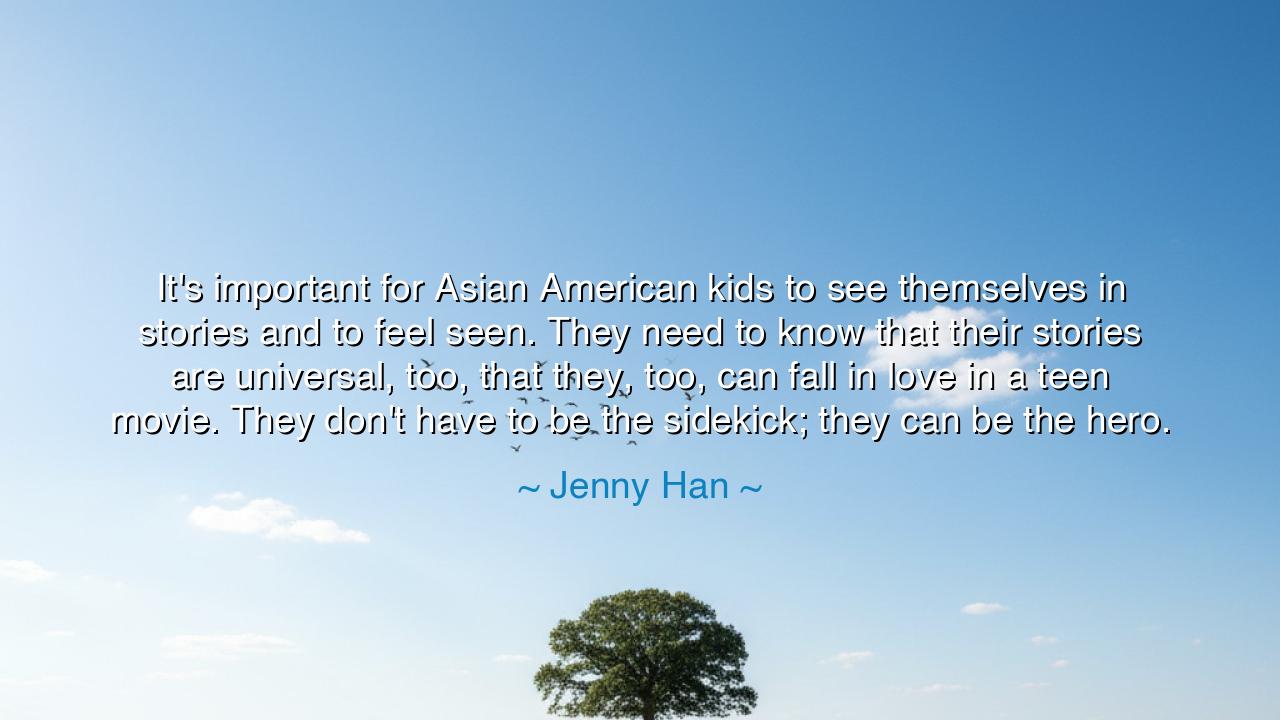
It's important for Asian American kids to see themselves in
It's important for Asian American kids to see themselves in stories and to feel seen. They need to know that their stories are universal, too, that they, too, can fall in love in a teen movie. They don't have to be the sidekick; they can be the hero.






When Jenny Han declared, “It’s important for Asian American kids to see themselves in stories and to feel seen. They need to know that their stories are universal, too, that they, too, can fall in love in a teen movie. They don’t have to be the sidekick; they can be the hero,” she gave voice to a hunger that has lived in countless hearts across generations—the hunger for recognition, for belonging, for the affirmation that one’s life is worthy of being at the center of the story. Her words do not speak merely of cinema; they speak of dignity, identity, and the sacred right of every human soul to see its reflection in the mirror of culture.
The origin of this truth lies in the deep power of storytelling. From the days when elders gathered their tribes around fires to tell tales of gods and ancestors, to the modern screens that glow in every home, stories have always shaped who we are and who we believe we can become. To be absent from those stories—or worse, to appear only as a caricature or sidekick—is to learn unconsciously that one’s life is secondary, that one is destined to support another’s narrative rather than live their own. Han’s words rise as a rebellion against this injustice, proclaiming that Asian American kids deserve not the margins, but the center stage.
Consider history: for centuries, the stories of women were hidden, their voices drowned by the louder chorus of men. Yet when writers like Virginia Woolf, Toni Morrison, and Maya Angelou carved space for women’s voices, they did more than write books—they expanded the very horizon of possibility for generations to come. In the same way, Jenny Han’s declaration is not about one genre, one movie, or one role, but about widening the lens of humanity itself, so that no child grows up believing their life is unworthy of being told.
The emphasis on teen movies is no small thing. For adolescence is the season when identity is fragile, when young hearts hunger to be told they are lovable, worthy, heroic. To see oneself fall in love, to see oneself chosen, cherished, and celebrated on screen, is to be granted a blessing: the assurance that “I, too, belong.” When those images are denied, a quiet wound forms, whispering that love and adventure belong only to others. Jenny Han’s triumph lies in declaring that these stories are universal—that the longing to love and be loved belongs to every heart, regardless of race or heritage.
Her words also carry a heroic weight: “They don’t have to be the sidekick; they can be the hero.” In these lines we hear the breaking of chains. Too long have people of color, not only in film but in life, been relegated to supporting roles, their worth measured by how they uplift the central figure of another. To say that one can be the hero is to say: you are not defined by others; you are the author of your own destiny. This is not merely a shift in cinema, but a shift in consciousness, a reclaiming of agency for all who have been made invisible.
The lesson here is clear: representation is not decoration, it is power. To be seen in the stories of a culture is to be given permission to exist fully, to dream boldly, to rise unashamed. If we wish to build a just world, we must ensure that all children see themselves not only as helpers, not only as background, but as the radiant centers of their own stories. To deny this is to dim the light of entire generations.
Practical wisdom flows from this. Seek out stories that reflect your own face, your own struggles, your own victories, and honor them. Support creators who widen the circle of representation, for by lifting their voices you ensure that others will follow. And if you yourself are a creator, be brave—write, draw, film, and sing the stories of your people, not as stereotypes but as fully human, fully alive. In this way, you not only honor yourself, but you hand a torch to those who come after.
Thus Jenny Han’s words must echo like prophecy: the Asian American child—and indeed every child—deserves to look upon the screen, the page, the stage, and see not a shadow, not a caricature, but a hero. To feel seen is to feel alive; to feel alive is to feel worthy of love. And so the teaching for all time is this: let every child be the hero of their own story, for in their stories the future of humanity is written.






AAdministratorAdministrator
Welcome, honored guests. Please leave a comment, we will respond soon